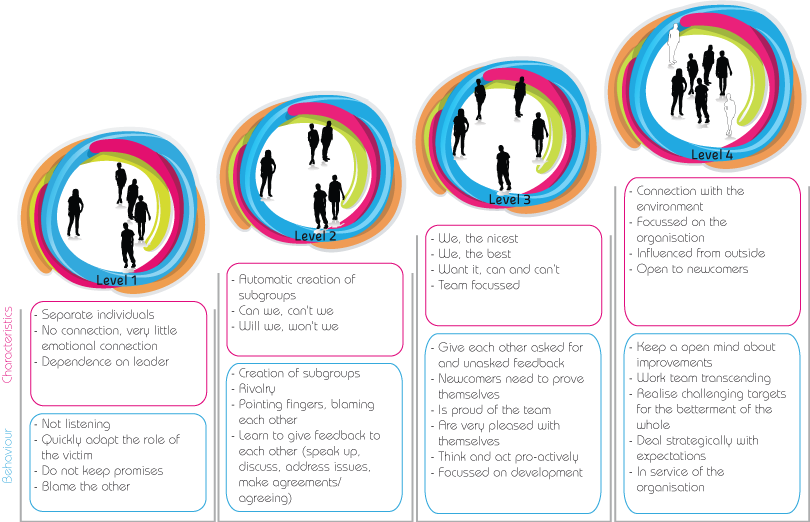The development phases of Tuckman are connected to the level of task maturity of a team. This level of maturity comes from the situational leadership model of Hersey and Blanchard. In the scheme below the characteristics and behavioural patterns of teams per level are shown.
Where do you stand or your team right now ?
Analyse where you or your team is situated right now. The following questions support this analysis.
1. What kind of behaviour is your team showing?
2. How are the members reacting to each other and on you?
3. How difficult is it for team members to solve a problem or a conflict?
4. What is your opinion about this situation looking from the perspective as a group member?
5. What would you like to see as the desired behaviour?
The development of task maturity, in other words, the maturity of a team is a direct reflection of the growth process from of the individual towards a group and of a group towards a team. By using the Team Development Cards this growth process is accelerated and will help by preventing the five most frequent frustrations whichevery team runs into, according to
Patrick Lencioni:
Creating trust
Through the cards, group members directly work on creating trust amongst each other. They become open and honest to the others and they feel comfortable in their vulnerability in relation to each other’s weaknesses, mistakes, fears and behaviour. Every time an individual’s or a team blind spot surfaces.
Using conflicts
Through frequent use of the cards, the group members no longer fear of having passionate discussions about subjects and decisions, which are essential for successfully achieving their goals. They won’t hesitate to have a dispute or a seriously difference of opinion, speak up about role expectations and assumptions; to disagree and by challenging the other with the intention to reach the best goal, they want to find the best solutions, discover the truth and take the right decisions.
Creating committment
Involvement is created through considering all ideas and suggestions seriously, which embeds trust in all team members, so that the mutually chosen solution is the best.
Accountabillity
By frequently looking back at the entire process, the group will feel involved and will start holding each other responsible for the decisions that have been taken and will remind each other of the goals that need to be achieved.
Focus on group result
The collective results ultimately determine the success of the team.


